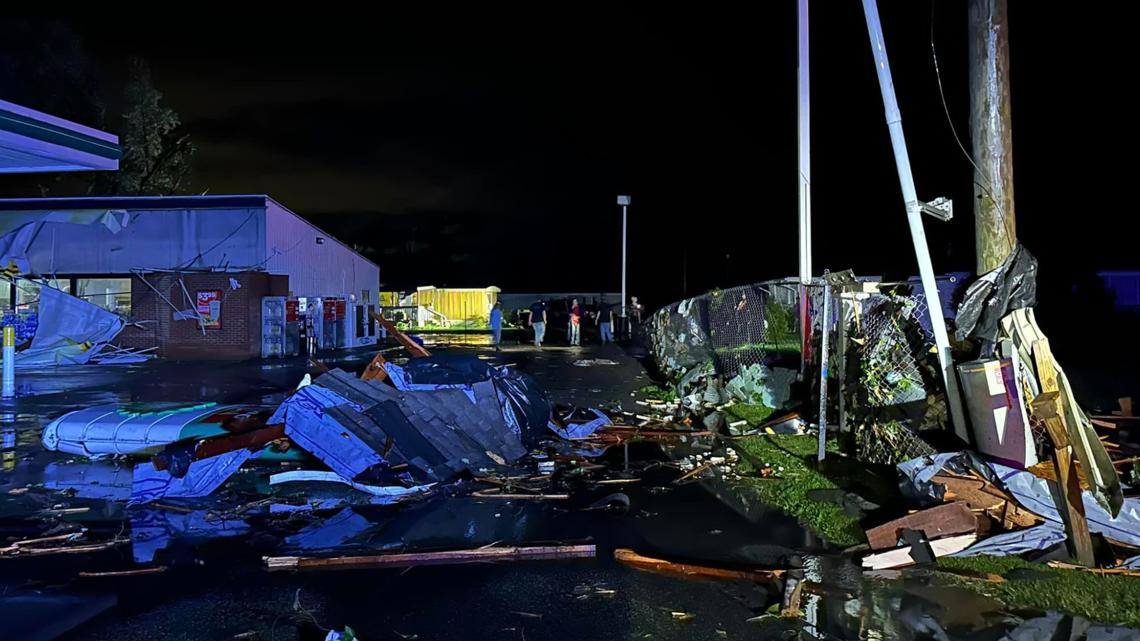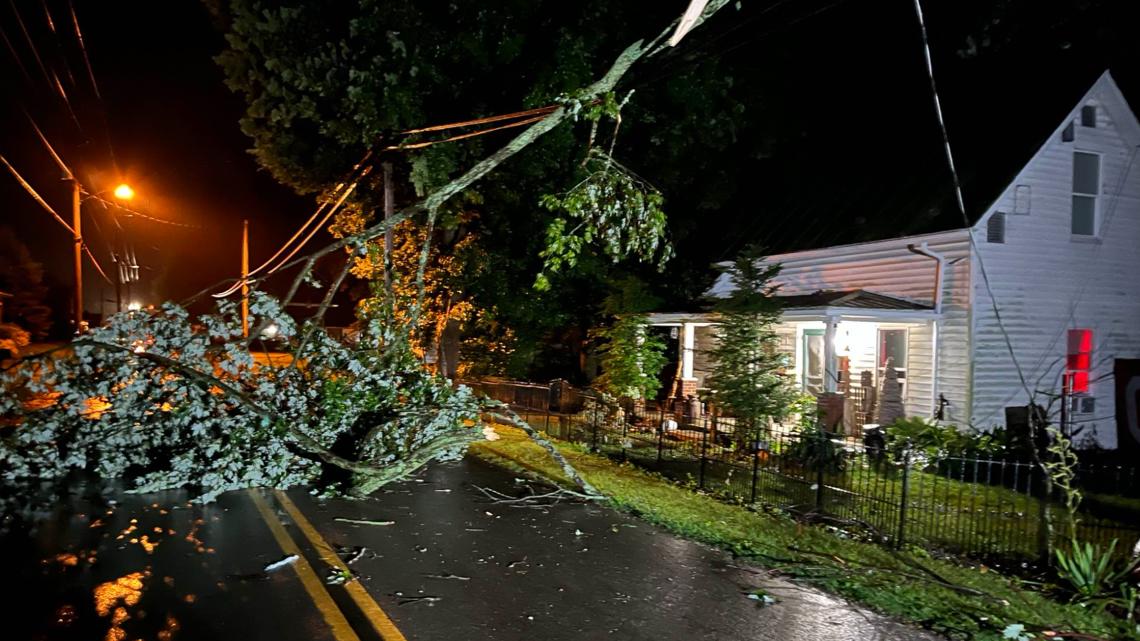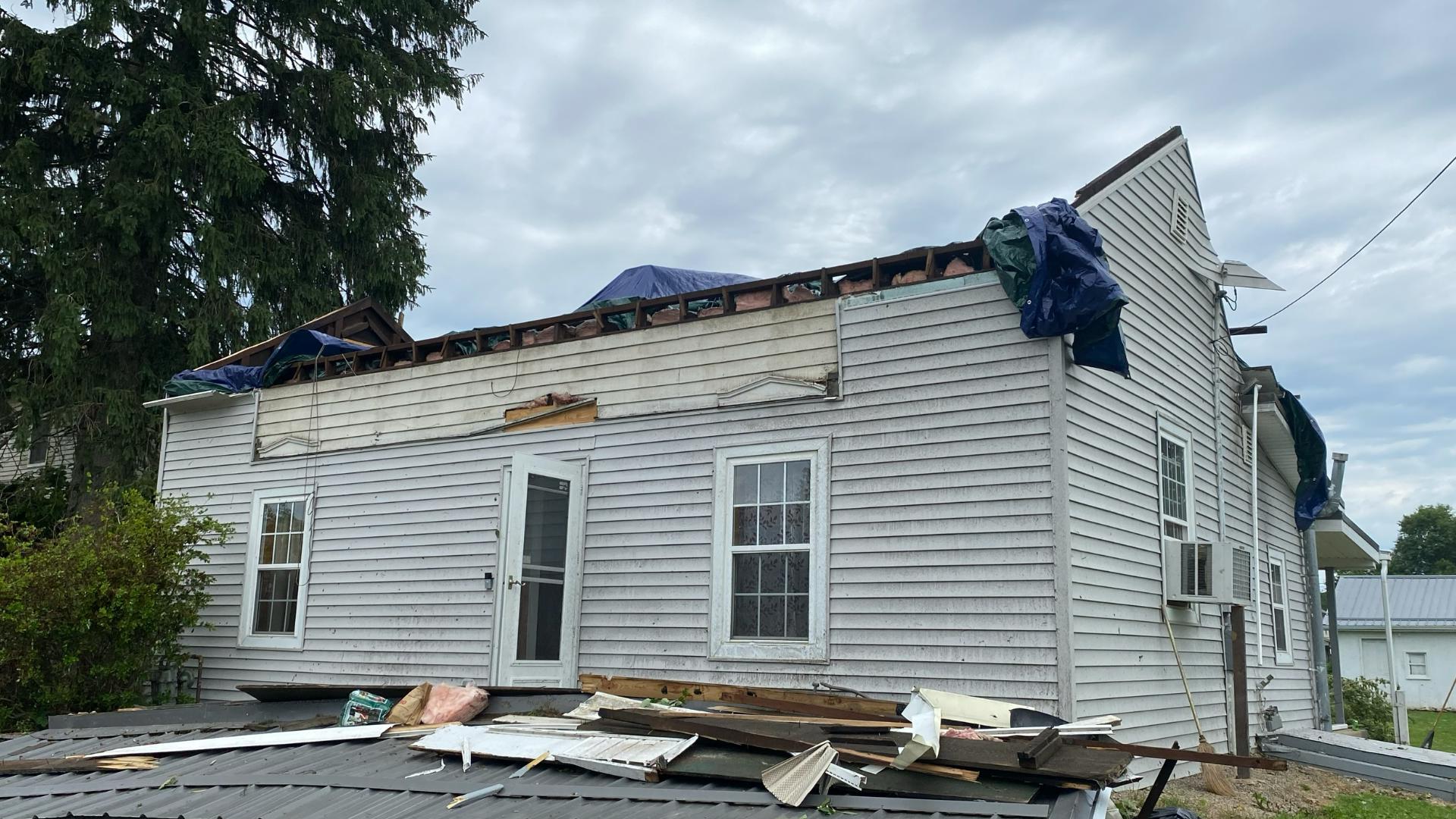COLUMBUS, Ohio — The National Weather Service confirmed four tornadoes touched down Wednesday night when storms passed through the region. The tornadoes hit Delaware, Licking, Knox and Muskingum counties.
Delaware County
A "brief and weak" EF0 tornado touched down at 8:02 p.m. in the Centerburg area in northeastern Delaware County.
The report from the NWS showed that the tornado reached a maximum wind speed of 65 mph and spanned 50 yards in width. The tornado traveled a quarter of a mile and lasted about one minute.
Video taken near the intersection of Olive Green and Fredericks roads showed a brief tornado developing and dissipating quickly as it moved through a wooded area along Porter Central Road, according to the NWS.
The Delaware County Emergency Management Agency said there was minor tree damage in the area.
Muskingum County
The NWS said another tornado was confirmed in the Village of Frazeysburg in Muskingum County. The weather agency confirmed the tornado was an EF2 with winds between 120 to 130 mph.
The tornado began at 12:37 a.m. and lasted three minutes, traveling over a mile. NWS said the tornado descended on the west side of the village in a cornfield before continuing to move east. The tornado began to weaken and dissipate as it reached the edge of town.
Muskingum County Emergency Management Agency Director Jeff Jadwin said there was extensive structural damage to the Village of Frazeysburg. Nine people were injured. Five of them were taken to a hospital in Zanesville for treatment and four others received medical treatment and weren't transported.


Knox County
A preliminary report from NWS says an EF0 tornado also hit the Miller Township area of Knox County. Max wind speeds are estimated to be about 85 mph and the tornado was on the ground for about three miles with a max width of 80 yards.
NWS said the tornado developed near County Road 26, south of Sycamore Road and continued eastward. Damage reported includes downed trees and damage to several residences.


Licking County
With the help of the Licking County Emergency Management Agency, the NWS confirmed an EF0 tornado hit Hanover with winds up to 80 mph. Crews are assessing damage along Lesley and Claylick roads. The NWS says trees were snapped and uprooted with a few structures receiving damage.
Doppler 10 Weather Resources
___
DOPPLER 10 SEVERE WEATHER SAFETY GUIDE
DIFFERENCES BETWEEN WATCHES & WARNINGS
Watch
A Watch indicates the possibility of severe weather in a relatively broad area. For instance, a tornado watch means conditions are favorable for the development of tornadoes. Go about your normal routines, but watch for threatening weather.
Warning
A Warning is issued when severe weather is actually occurring. For instance, a tornado warning means a tornado has actually been sighted or has been indicated by radar. The warning usually encompasses a relatively small geographic area. If a warning is issued for the area in which you live, take cover immediately!
TORNADOES AREN'T THE ONLY REASON TO STAY ALERT
Strong Winds
Strong winds of 55 mph or more can cause significant damage even though no tornado is present. "Downbursts" are columns of air that slam to the earth and spread high winds in many directions. Downbursts can be just as damaging as tornadoes; if such conditions are present, take the same precautions as you would for a tornado.
Lightning
Lightning claims more lives every year than tornadoes. When lightning is a threat, stay indoors and don't use electrical appliances. If you're caught outside, keep a safe distance from tall objects, and try to stay lower than anything nearby. A safe distance from a tree is twice its height.
TAKING COVER
Storms producing tornadoes in Ohio often approach from the southwest. They can travel at speeds up to 70 miles per hour and contain winds estimated at over 200 miles per hour.
Sometimes an approaching tornado will sound like the roar of a train or airplane. If you see or hear a tornado, take cover immediately. Seek shelter inside, preferably below ground level. Do not waste time opening windows; tornado-force winds will "open" the windows well before the pressure difference can cause any structural damage. Above all, protect your head and lie flat.
At Home
Get away from windows, doors and outside walls. Go to the basement. If you have no basement, go to a first floor bathroom, closet or room at the center of the house. If possible, get under heavy furniture and cover your head with blankets or pillows.
At School
Go to the lowest floor or basement. Go to small interior rooms or hallways. Stay away from windows and avoid auditoriums, gyms and other areas with wide, free-span roofs.
In Public Buildings
Go immediately to the designated shelter area or to an interior hallway or small room on the lowest level. Stay away from windows. Do not use elevators. Do not go to your car.
During tornado drills or actual tornado warnings, remember to DUCK
D – Go DOWN to the lowest level, stay away from windows
U – Get UNDER something (such as a basement staircase or heavy table or desk)
C – COVER your head
K – KEEP in shelter until the storm has passed

